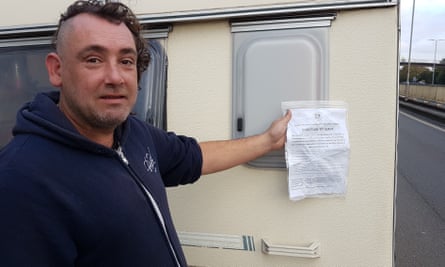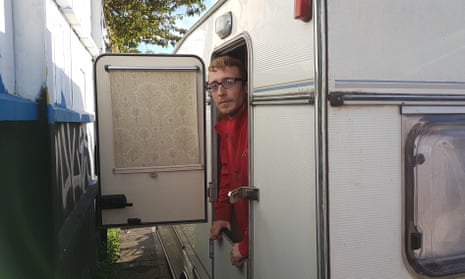Brian Meekle’s caravan is parked beside the M32 motorway that cuts through the eastern half of Bristol. Meekle has been living there for the past two months because he doesn’t earn enough from the 33-to-45-hour weeks he works at a nearby retail warehouse to pay the rent for a flat.
“The rents in Bristol have rocketed,” he says above the roar of lorries and cars. “I am doing agency work but it could dry up on Monday. It’s all minimum wage stuff.” Meekle’s temporary home is in a ramshackle line of 16 caravans and vans. There are at least seven other vehicle encampments in the city, including in wealthy neighbourhoods such as Clifton Down. Bristol city council estimates that around 200 people are sleeping in vehicles across the city.
While some of them enjoy the freedom of life on the road, many are low-paid workers who have been priced out of Bristol, which has in recent years experienced some of the fastest-rising rents and house prices of any city.
Rents in Bristol have gone up by 33% over the past four years, according to the government’s Valuation Office Agency. A one-bedroom flat in the city now costs on average £795 a month. “There are a lot of people in this situation that don’t want to be,” says Meekle. “But it’s better to have a roof over your head than be out on the streets.”
He will soon be forced to move on to a new road because the council has served all the vans and caravans with eviction notices following complaints of antisocial behaviour.

Meekle’s neighbour Tom Burgess, a graffiti artist who also works in home removals, says the van dwellers are the victims of crime, not the perpetrators. “Everyone along here got broken into. It puts you on edge. I wake up in the night when I hear something,” he says. A few vans along, Alex Groiss is waiting for his girlfriend, a carer in Clifton. “She is working with children at the moment – it’s not well paid,” he says. “Even though she has been working in care for three or four years, it’s just above minimum wage.”
Another van dweller, Nigel, who has been working as a chef in a nearby pub, says he is not earning enough to pay for a flat along with bills and food. “The noise and pollution are horrible. I’d like to be in a flat, but I’m only earning £600 a month.”
Bristol is not the only city where people have resorted to living in vans and caravans. Homelessness charities report people living in vehicles across the country. Petra Salva, director of outreach services at St Mungo’s, whose teams cover London and the south-west, says it is not unusual for her workers to come across vehicles that people are using as homes.
“People will find ways of coping with the shortage of genuinely affordable homes and using a vehicle is one option,” she says. “It ranges from people who would be on the street otherwise to people who are surviving on the fringes of the labour market.”
Residents living near the slip-road encampment are divided about their van- and caravan-dwelling neighbours. Jon Newey, the director of the nearby St Werburghs Community Centre, which is opposite the encampment, says he has allowed them to use the toilets and charge their phones but has had to draw the line at people filling water tanks and washing themselves. “As a centre we haven’t had any real problems. They are just another part of the community we serve, but we’ve had to set up limitations,” he says.
Beth Friedeberg, a charity worker who is sitting in the centre’s cafe, believes living in vehicles is better than being on the streets. “There aren’t enough houses and there’s not enough work for people,” she says.

But Hassan Hamed, a lab technician who is waiting to use the centre’s computers, says the van dwellers have made his daughter’s walk to school dangerous. “They are blighting the walkway,” he says. “I cannot trust my daughter to walk to school safely because they are parking on the pavement.”
Concerns like these have led Bristol to become the first council to consult on a specific policy to deal with people living in vehicles. The proposal is to tolerate short-term, low-impact encampments but move on those causing disruption.
In June the council evicted more than 50 vehicles from Greenbank cemetery on the other side of the M32 after a blaze destroyed two caravans and a car. Local residents complained of noise, drugs, rubbish and people using their gardens as toilets.
Paul Smith, Bristol’s cabinet member for housing, says officers will only act where there is evidence of serious antisocial behaviour. “Most people living in vehicles are not causing any antisocial behaviour,” he says. “It is only a concern when you get late-night noise, people feeling under threat, rubbish and waste being disposed of in the street.”
Smith says he would like to be able offer them affordable housing in Bristol: “They are mainly single men and we are looking at building a larger number of one-bedroom properties that are suitable for them.”
But this feels a long way off for the young people living beside the M32. They are due to go today. Burgess says: “We’ve found another road on an industrial estate. That’s where most of us are going to go.”
